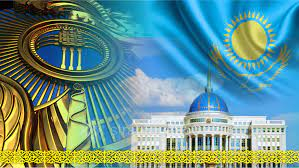
From the moment of the emergence of trade relations between different segments of the population, and then between states, the first prerequisites for customs relations arise. There is a certain layer of people called merchants who specialized in international trade. Merchants paid tribute to the state treasury for the movement of caravans with goods on the territory of states, as well as for trade in cities. This payment from trade became a revenue part of the budget of the state treasury and represented a kind of "customs payments".
The formation and development of the customs service of Kazakhstan is inextricably linked with the history of independent statehood. In 1991, expressing the will of the people, Kazakhstan declared its state independence. At the same time, the Customs Committee of the Republic of Kazakhstan was established by the Decree of the President of the Republic of Kazakhstan dated December 12, 1991.
The Customs Service is one of the main attributes of the statehood and independence of the country, the assertion of the political and economic sovereignty of our state.
The first legislative act, which was the main instrument of trade policy and state regulation of foreign economic activity of independent Kazakhstan, was the Law of the Republic of Kazakhstan "On Customs Tariff and Duty", adopted on December 24, 1991.
One of the most pressing issues for participants in foreign economic activity (hereinafter referred to as foreign economic activity) is the classification of goods according to the Commodity Nomenclature of Foreign Economic Activity (HS).
Classification of goods in accordance with the HS means the definition of their digital classification codes, i.e. the assignment of goods to specific commodity items, subpositions, subpositions of the HS with their corresponding numeric codes. The main purpose of classification according to HS is the application of tariff and non-tariff regulation measures.
The creation of the HS, used for modern international foreign economic practice, was preceded by a long history.
Customs, by its very nature, is a link between the domestic economy and the world economy, and customs policy, being the basis of customs affairs, is precisely a system of measures that determine priorities, ways and means of achieving state goals in the development of trade and economic relations.
That is why one of the main means of implementing the customs policy of the Republic of Kazakhstan as an integral part of the domestic and foreign policy of the country is its participation in customs unions and other forms of integration.
This is a fundamentally new approach to customs regulation – automation of business processes at customs.
Introduction of electronic declaration
Declaration on paper will remain only in some cases, for example, in case of technical failures.
A "Single Window" mechanism is provided
. Customs authorities will not request documents from the declarant in the event that they can be obtained from the information systems of state bodies.
Customs declaration is carried out by filing customs declarations in electronic form. An exception is made only in case of failures of information systems, as well as when declaring goods transported in accordance with the customs transit procedure, goods for personal use, as well as vehicles of international transportation.
One of the main progressive provisions of electronic declaration is the possibility of registration and issuance of customs declarations by an information system in automatic mode without the participation of an official of state revenue bodies.
The institute of preliminary information has been significantly modernized. Now the submitted preliminary information can be used for several customs operations with mandatory feedback from the person who submitted such information.
A new form has been introduced on granting a participant in foreign economic activity a deferral or installment payment of customs duties.
Customs legislation facilitates the conduct of foreign economic activity, allows the Republic of Kazakhstan to maximize transit and export potential, protects and supports domestic entrepreneurs.





























